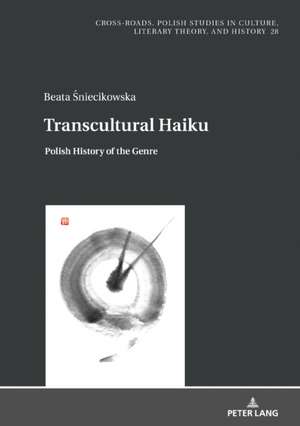Transcultural Haiku: Cross-Roads
Autor Beata Sniecikowska Traducere de Justyn Huniaen Limba Engleză Hardback – 27 oct 2021
Din seria Cross-Roads
-
 Preț: 517.32 lei
Preț: 517.32 lei -
 Preț: 514.05 lei
Preț: 514.05 lei - 23%
 Preț: 451.25 lei
Preț: 451.25 lei -
 Preț: 514.05 lei
Preț: 514.05 lei - 23%
 Preț: 454.94 lei
Preț: 454.94 lei - 23%
 Preț: 452.06 lei
Preț: 452.06 lei -
 Preț: 493.94 lei
Preț: 493.94 lei - 23%
 Preț: 456.20 lei
Preț: 456.20 lei -
 Preț: 500.68 lei
Preț: 500.68 lei - 23%
 Preț: 446.99 lei
Preț: 446.99 lei -
 Preț: 490.43 lei
Preț: 490.43 lei -
 Preț: 555.84 lei
Preț: 555.84 lei -
 Preț: 493.33 lei
Preț: 493.33 lei -
 Preț: 442.59 lei
Preț: 442.59 lei - 23%
 Preț: 454.94 lei
Preț: 454.94 lei - 23%
 Preț: 439.59 lei
Preț: 439.59 lei -
 Preț: 492.40 lei
Preț: 492.40 lei -
 Preț: 527.22 lei
Preț: 527.22 lei - 23%
 Preț: 439.44 lei
Preț: 439.44 lei - 23%
 Preț: 589.42 lei
Preț: 589.42 lei - 23%
 Preț: 525.79 lei
Preț: 525.79 lei - 23%
 Preț: 673.25 lei
Preț: 673.25 lei - 23%
 Preț: 525.50 lei
Preț: 525.50 lei - 23%
 Preț: 467.02 lei
Preț: 467.02 lei -
 Preț: 500.21 lei
Preț: 500.21 lei
Preț: 497.98 lei
Preț vechi: 646.73 lei
-23% Nou
Puncte Express: 747
Preț estimativ în valută:
95.31€ • 99.24$ • 80.54£
95.31€ • 99.24$ • 80.54£
Carte tipărită la comandă
Livrare economică 08-22 martie
Preluare comenzi: 021 569.72.76
Specificații
ISBN-13: 9783631846490
ISBN-10: 3631846495
Pagini: 468
Dimensiuni: 148 x 210 mm
Greutate: 0.98 kg
Editura: Peter Lang Copyright AG
Seria Cross-Roads
ISBN-10: 3631846495
Pagini: 468
Dimensiuni: 148 x 210 mm
Greutate: 0.98 kg
Editura: Peter Lang Copyright AG
Seria Cross-Roads
Notă biografică
Beata Sniecikowska is a literary scholar and art historian, Associate Professor in the Institute of Literary Research of the Polish Academy of Sciences in Warsaw. Her main research areas are intersections of literature and visual arts, as well as figures of sound in experimental poetry.
Cuprins
haiku - Polish poetry - literary genres - Japanese poetry - visual arts - verbo-visuality - transculturality - Modernism - translation studies - mindfulness - intertextuality - miniature poems - book art - typography - calligraphy - Japanese culture - senryu - haiga - sumi-e - haibun - Zen Buddhism - Taoism
Descriere
The monograph presents the Polish history of haiku and the forms associated with the genre - in literature and visual arts. Polish works are confronted with Japanese poetry (along with its aesthetic and philosophical contexts) and with haiku-inspired works of different Western authors. The book also touches upon various translatological problems.
